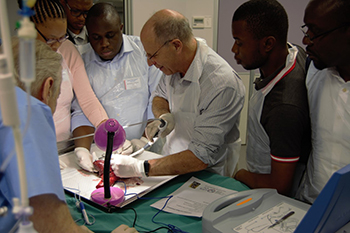Latest News Archive
Please select Category, Year, and then Month to display items
18 November 2024
|
Story Jacques Maritz
|
Photo Supplied
 Muhammad Cassim, a second-year student in the Department of Engineering Sciences in the Faculty of Natural and Agricultural Sciences.
Muhammad Cassim, a second-year student in the Department of Engineering Sciences in the Faculty of Natural and Agricultural Sciences.
Muhammad Cassim, a second-year student in the Department of Engineering Sciences in the Faculty of Natural and Agricultural Sciences at the University of the Free State, will participate in the winter university project in Pskov, Russia, from 25 November to 9 December 2024.
The winter school aims to strengthen relationships among young engineers and deepen international interaction via skills improvement, joint projects, and social cohesion. The programme boasts a densely packed education block, project block, and cultural block.
Cassim is part of the UFS Grid Related Research Group and actively participates in research centred on complexity science. He intends to complete his BSc Physics degree with Engineering subjects and progress towards postgraduate studies in the UFS Department of Physics.
He is currently working on verifying experimental developments in the field of synchronisation in complex networks. While he has already completed this high-performance computing training in his first year under the leadership of Albert van Eck (Director, UFS E-research), he is looking forward to the masterclasses in holographic modelling, deep learning, direct laser deposition, and database. Closely resembling his current research, he will have the opportunity to gain more experience in the use of set theory and graph theory in solving digital information processing problems.
For more information about international scholarships for study abroad opportunities, contact Mbali Moiketsi in the Office for International Affairs.
Cassim’s student profile is the culmination of the department’s strategy to produce young applied scientists who are subjected to the culture of research during their undergraduate study and could articulate with ease to other departments for postgraduate studies. The department aims to align with the UFS’ Vision 130 by producing competitive students who can operate in the postgraduate paradigm with the digital themes of veterinary science and ecological engineering science.
Great turnout for Hannes Meyer Symposium in Cardiothoracic Surgery
2017-05-05

Symposium attendees watch attentively as
Dr Johan Brink demonstrated a MAZE procedure
with a pig’s heart.
Photo: Supplied
The University of the Free State’s Faculty of Health Sciences hosted the annual Hannes Meyer Symposium in Cardiothoracic Surgery. The symposium was organised by Prof Francis Smit, head of the department of Cardiothoracic Surgery at the UFS, with the support from the Society of Cardiothoracic Surgeons of South Africa and the European Association of Cardiothoracic Surgery (EACTS). Over the past 16 years this symposium has steadily been growing in stature and prestige leading to the resounding success that was this year’s event.
Medical advancements explored
The aim of the symposium is to provide an overview of the latest advances in Cardiothoracic Surgery and perfusion as well as providing hands-on training via simulation to trainees from South Africa and the rest of the African continent. Didactic lectures and papers by registrars were an integral component of the symposium. The South African community was represented by various heads of departments, trainees, senior specialists and perfusionists from all the training centres in the country. There were also delegates representing Uganda, Mozambique, Nigeria and Zambia.
Heart surgery off to new heights
Simulation in Cardiothoracic Surgery and Perfusion can be compared to airline pilots with high risk, with complex surgeries being first done in simulators before being attempted in the real world. The UFS is proud to have a state-of-the-art simulation facility, which was used to facilitate the programme.
The range of simulation was extensive and included simple procedural models to complex full theatre setups with Human Performance Models in perfusion that simulated crisis scenarios with the aid of computerised devices that react in real time to human intervention.
Industry support highly appreciated
This event was coordinated by Dr Jehron Pillay, senior registrar in the Department of Cardiothoracic Surgery and Marilee Janse van Vuuren, deputy-director clinical technology, in the department. This was the first time that such extensive simulation models were used in the programme and judging from the positive response received, it has certainly set the benchmark for all future events.
The event has received invaluable support over the years from EACTS that has selected Bloemfontein as the site of its African training programme as a result of the high level of training and education achieved here.
The academic discussions were chaired by Profs Marko Turina and Jose Pomar (past presidents of EACTS) and Pieter Kappetein (past secretary general of EACTS) who are extremely well known internationally for their contribution to advancing Cardiothoracic training and education.
Our guests from EACTS presented didactical lectures on research methodology, international randomised trials and discussed recent developments and controversies in cardiothoracic surgery.
Registrars from all South African units presented a thoracic and cardiac surgery paper from each unit highlighting specific disease conditions, moderated by heads of departments and the international panel.
An event of this magnitude requires significant financial support and the medical industry in South Africa stepped up to the plate in providing financial and logistical support in order to make it possible.